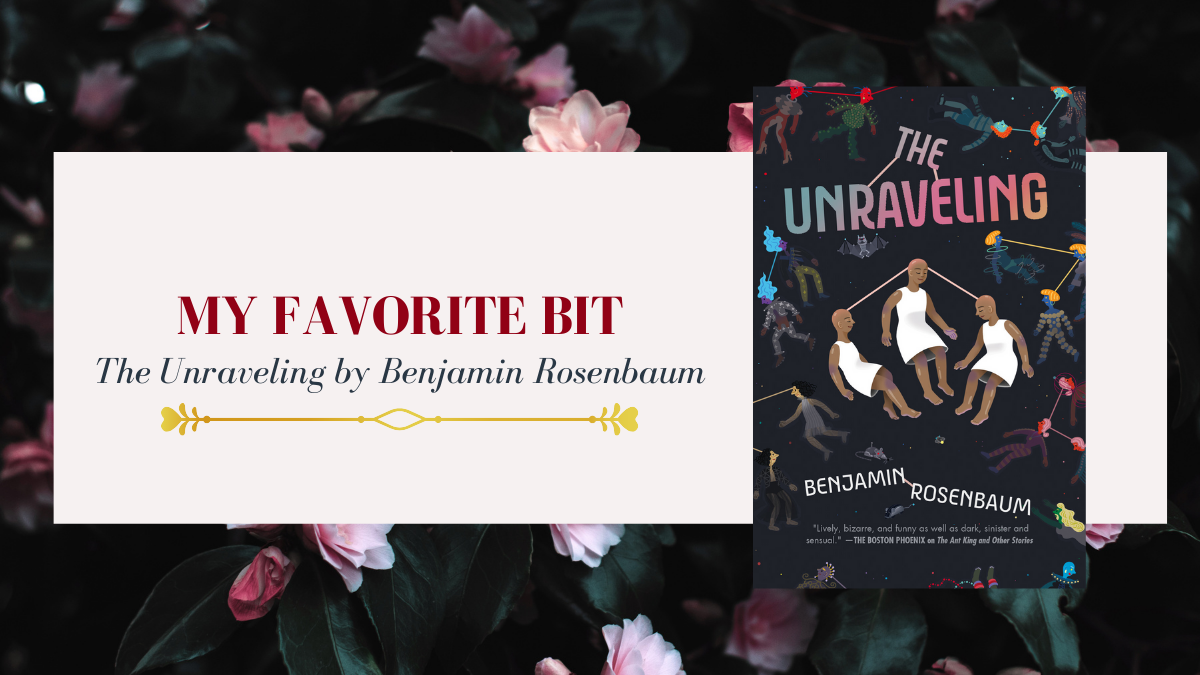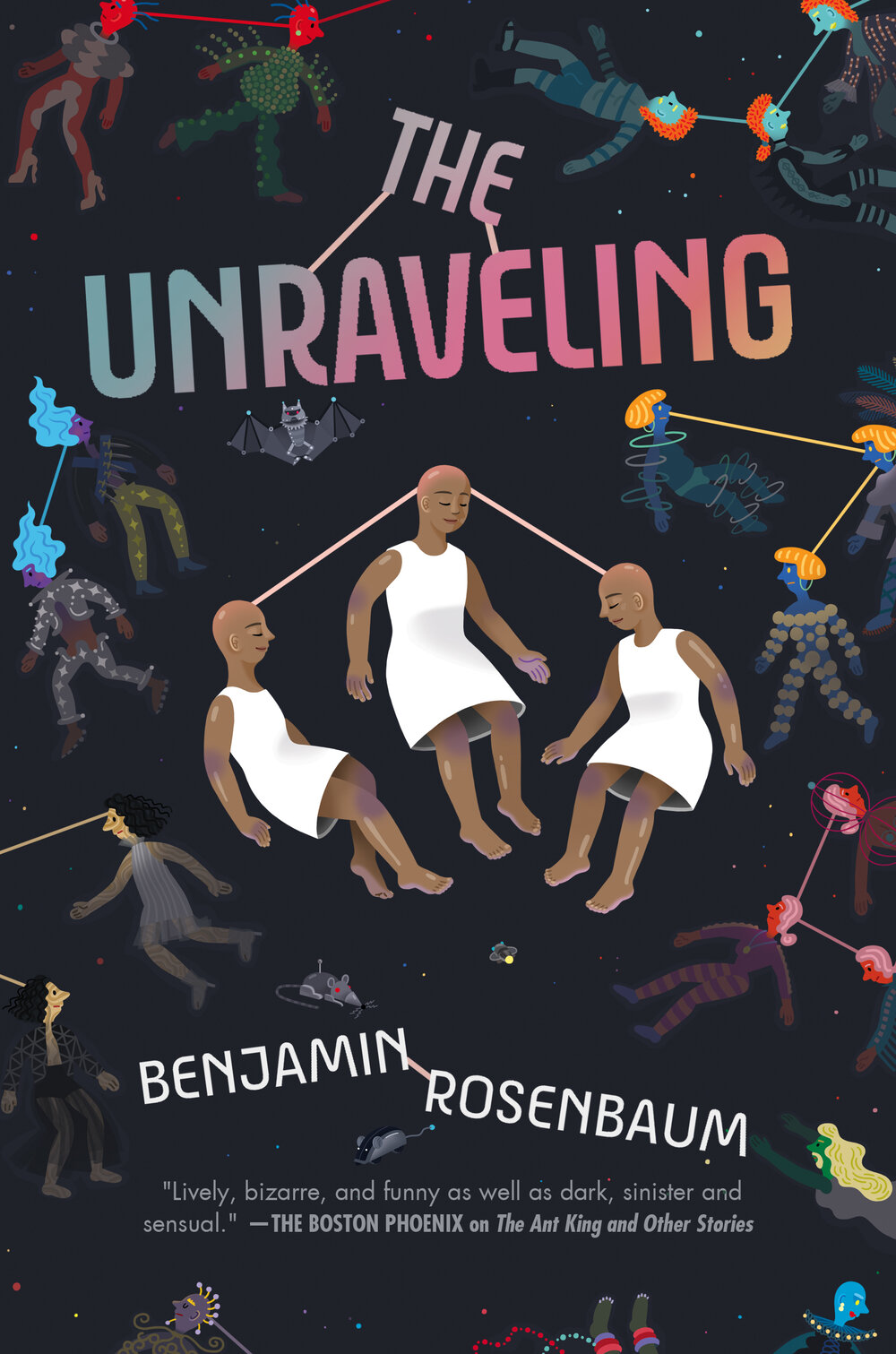
Benjamin Rosenbaum is joining us today to talk about his novel, The Unraveling. Here’s the publisher’s description:
In the distant future, somewhere in the galaxy, a world has evolved where each person has multiple bodies, cybernetics has abolished privacy, and individual and family success are reliant upon instantaneous evaluations of how well each member conforms to the rigid social system.
Young Fift is an only child of the Staid gender, struggling to maintain zir position in the system while developing a friendship with the acclaimed bioengineer Shria—a controversial and intriguing friendship, since Shria is Vail-gendered.
Soon Fift and Shria unintentionally wind up at the center of a scandalous art spectacle which turns into a multilayered Unraveling of society. Fift is torn between zir attraction to Shria and the safety of zir family, between staying true to zir feelings and social compliance . . . when zir personal crises suddenly take on global significance. What’s a young Staid to do when the whole world is watching?
What’s Benjamin’s favorite bit?

BENJAMIN ROSENBAUM
The Unraveling is set in the far future of humanity, but it’s not space opera. Though the narrative zooms out as the characters’ decisions end up affecting the whole world, much of the book is a domestic social comedy. There’s plenty of first love, fraught friendship, existential angst, and social satire. But, at its heart, it’s a book about parenting (the work of being a parent) and childing (the work of being a child).
Fift, the main character of The Unraveling, has nine parents. On Fift’s planet, that’s not nearly enough; it’s bordering on irresponsibility for a group of only nine people to try and raise a child… especially when most of them are Vails, the gender thought of as impulsive, emotional, and violent.
While I was writing this book, thinking about Fift and zir nine parents, my own kids were growing up. I was thinking a lot about parenting, and I was also remembering my own childhood.
There’s a double consciousness in being a parent. I saw my kids through my own eyes: worrying about them, wanting them to flourish but also wanting to protect them, trying to help them fit into the world they were born into without strangling their authentic selves. But I also saw myself through their eyes. I remembered when my parent’s worries felt suffocating, their rules unjust, their prophecies about me infuriating. How I wanted their approval, and desperately resented wanting it.
Parenting is the most profound thing I will ever do; and of course, like all parents, I spent a lot of time fucking it up.
The Unraveling begins and ends with moments between Fift and one of zir parents, Father Squell. Squell is sympathetic and affectionate and nervous. Squell is doing vir best to support Fift. And Squell’s worrying and anxiety often make Fift’s life untenable. As Fift begins to chafe against the rules of zir society, and in particular its strict gender norms, Squell — nervous that not fitting in will have terrible consequences for Fift — is the voice of normativity, insisting that Fift conform.
I have a distinct memory of sitting on the steps of a public building with my furious six-year-old daughter, trying to explain why we have to wear clothes, even if it is warm enough to go naked. I knew — and admitted — that if she’d been born somewhen somewhere else, the rules would have been different. I knew she was, in some cosmic sense, right. And yet I did actually also have to get her to keep her clothes on.
Parents are pressed into service as society’s enforcers. We are likely to love our children, and also, inevitably, to suppress them.
One of my favorite reviews of the book said: “I desperately want to slap all of [Fift’s] parents. Well, almost all of them.”
Squell is surely one of the ones they want to slap. Squell is SO ANNOYING.
Squell is, of course, me. They’re all me.
It’s hard to pick a favorite bit, in a book chock full of things that amused and delighted me. The moment in the lab with Shria when Fift is startled to find zirself with unexpected privacy, in a panoptic world where privacy is a scarce good. The social comedy of three-bodied Fift being up to shenanigans in one body, while simultaneously trying to play it cool with zir parents at the breakfast table in another. The conversation with Thavé, the long-lived alien, about the fate of civilizations. The shout-out to my adopted city of Basel’s Carneval, when the huge parade of Clowns with phantasmagoric bodies shows up. Dobroc’s fanvid. The zany stock-report-analogue by Zango Jango. The love stories. The big set pieces and reversals.
But I keep coming back to Father Squell. To the moment in the very beginning, where Squell is waking up five-year-old Fift, stroking zir eyebrow and saying, “good morning, little cubblehedge. You have a big day today,” and Fift crawls into vir lap to cuddle. To all Squell’s failures and mistakes in the decade that follows. To the little moment between them, almost an afterthought, at the end.
Squell loves Fift a lot. Squell very much wants to be a good parent. Ve screws it up royally. And Fift, too, does things that ze regrets.
That love is bruised and battered, tested terribly. Many other things are lost. But, in the end, that love is intact.
I guess that’s my favorite bit.
LINKS:
The Unraveling Universal Book Link
BIO:
Benjamin Rosenbaum has been nominated for the Hugo, Nebula, BSFA, Sturgeon, and World Fantasy Awards. He is the author of the short story collection The Ant King and Other Stories, and the Jewish historical fantasy tabletop roleplaying game “Dream Apart.” Originally from Arlington, VA, he lives near Basel, Switzerland with his wife and children.
